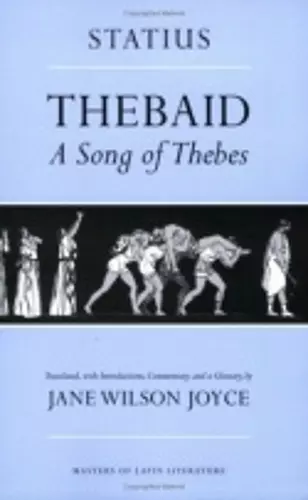Thebaid
A Song of Thebes
Statius author Jane Wilson Joyce translator
Format:Paperback
Publisher:Cornell University Press
Published:15th Nov '08
Currently unavailable, our supplier has not provided us a restock date

The clarity of Joyce's translation highlights the poem's superb versification, sophisticated use of intertextuality, and bold formal experimentation and innovation. A substantial introduction and annotations make this epic accessible to students of all levels.
The Thebaid, a Latin epic in twelve books by Statius (c. 45–96 C. E.) reexamines events following the abdication of Oedipus, focusing on the civil war between the brothers Eteocles, King of Thebes, and Polynices, who comes at the head of an army from Argos to claim his share of royal power. The poem is long—each of the twelve books comprises over eight hundred lines—and complex, and it exploits a broad range of literary works, both Greek and Latin. Severely curtailed though he was by the emperor Domitian and his Reign of Terror, Statius nevertheless created a meditation on autocratic rule that is still of political interest today. Popular in its own time and much admired in the Middle Ages and the Renaissance—most notably by Dante and Chaucer—the poem fell into obscurity and has, for readers of English, been poorly served by translators.
Statius composed his poem in dactylic hexameters, the supreme verse form in antiquity. In his hands, this venerable line is flexible, capable of subtle emphases and dramatic shifts in tempo; it is an expressive, responsive medium. In this new and long-awaited translation the poet Jane Wilson Joyce employs a loose, six-beat line in her English translation, which allows her to reveal something of the original rhythm and of the interplay between sentence structure and verse framework.
"Jane Wilson Joyce's translation of the Thebaid is a stunning achievement. The long lines of loosely flowing rhythms represent Statius' manner more accurately and vividly (and in more accomplished verse) than any translation of the poem I have seen. The result is a sophisticated and very challenging poem, striking and even austere in some ways, hardly modern yet less old fashioned than other fashioned, and in its way quite new." -- William Levitan, Grand Valley State University
"Our generation has developed such an appetite for violence and horror that it is more than ready to appreciate Statius' Thebaid. Thanks to Jane Wilson Joyce, a poet in her own right, we now have a rich and vivid translation that matches the pace and urgency of Statius' narrative: his gods are vindictive, his demons gruesome, his champions brutal, while brave and innocent young warriors meet their deaths and loving women grieve for them. Statius' imaginative power and Joyce's language set before us in passionate variety scenes of human hatred and loyalty, arrogance and exaltation, supernatural omens, ghosts and furies, and a fratricidal climax that drives the gods from the battlefield in sheer disgust. How lucky for readers that Jane Wilson Joyce is also a scholar! She has doubled the value of her work by supplying everything the reader needs to follow the heroic tale, a substantial introduction on Statius' life and times, synopses to open each book, footnotes, and a lively critical commentary." -- Elaine Fantham, Giger Professor of Latin Emerita, Princeton University
"The scholar-poet Jane Wilson Joyce offers a new translation of Statius' Thebaid that is a major contribution to the field. Very readable, well researched, and insightful, it should prove useful and stimulating to students, casual readers, and serious scholars (both Statians and the uninitiated). It addresses three important needs. It provides the first English commentary on the epic in its entirety. It is the first verse translation in English using a six-beat line. And it it's the first English translation with a decent chance of convincing readers that Statius the epic poet can be enjoyable, that his is indeed a vox iuncunda.... This vigorous, engaging translation, copious supporting material, and confident interpretive voice... rewards casual reading or more intense study. An impressive achievement that will be hard to match, it deserves to become the new standard." -- Kyle G. Gervais, Bryn Mawr Classical Review
ISBN: 9780801482854
Dimensions: unknown
Weight: 907g
544 pages